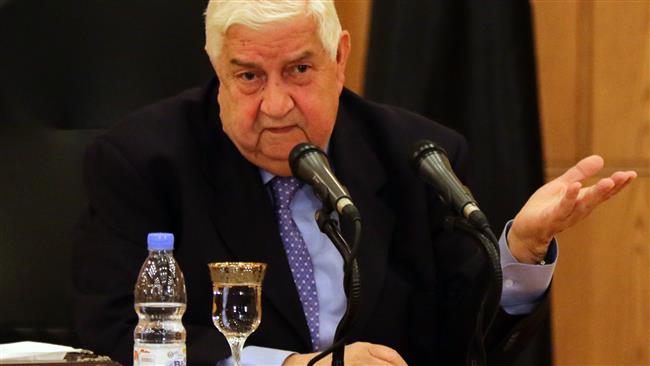
RNA - The Jabhat Fateh al-Sham terror group, formerly known as al-Nusra Front, Daesh “and other [terrorist] organizations continue to store chemical weapons in urban and residential areas," Muallem told a press conference in Damascus on Thursday.
He made the remarks two days after a suspected chemical attack targeted the town of Khan Shaykhun in Syria’s northwestern Idlib Province. It was followed by alleged air raids that struck a hospital where victims of the assault were being treated.
The so-called Syrian Observatory for Human Rights put the death toll at 86, including 30 children and 20 women.
Western countries have pointed the finger at Damascus over the attack while Syria’s opposition has accused the Syrian government of bombing Khan Shaykhun with chemical munitions.
Commenting on the incident, Muallem assured that Damascus did not and would not use chemical arms, even against terror outfits.
"I stress to you once again: the Syrian army has not, did not and will not use this kind of weapons -- not just against our own people, but even against the terrorists that attack our civilians with their mortar rounds," he said.
The top Syrian diplomat also noted that the Syrian military had carried out an airstrike on a depot, where terrorists stored chemical weapons.
"The first air raid conducted by the Syrian army was at 11:30 am (0830 GMT) on that day (Tuesday) and it attacked an arms depot belonging to al-Nusra Front that contained chemical weapons," he said.
The remarks echoed those by Russia’s Defense Ministry that a Syrian strike had hit a "terrorist warehouse" used for making bombs containing "toxic substances.”
The Organization for the Prohibition of Chemical Weapons (OPCW) and the Independent International Commission of Inquiry on the Syrian Arab Republic are both investigating the Idlib attack.
Muallem said Syria would provide the OPCW and the UN with “intelligence on the transfer of chemical substances from Iraq into Syria, or from Turkey into Syria.”
He said Damascus needs assurances that any fact-finding mission into the Idlib attack would not be politicized, adding that his country’s past experience with international inquiries had not been "encouraging."
Any investigative mission should be far from the sphere of Turkish influence, the Syrian foreign minister pointed out.
Putin dismisses accusations against Syria as unfounded
Russian President Vladimir Putin dismissed as "unfounded” accusations leveled against the government of Syria over the "incident with chemical weapons."
He made the remarks in a phone call with Israeli Prime Minister Benjamin Netanyahu on Thursday, the Kremlin said in a statement.
"There was an exchange of opinions over the incident with chemical weapons that took place in the Syrian province of Idlib on April 4," the statement noted, adding, "Putin in particular underlined the unacceptability of making unfounded accusations against anyone before a thorough and impartial international investigation is carried out."
Washington has no objective data on Idlib incident: Kremlin
Separately on Thursday, Kremlin spokesman, Dmitry Peskov, said Washington's allegations that Syrian forces were behind the deadly Idlib attack were not based on "objective" information.
"No one could have any realistic, verified information. Any data that the American side or our colleagues in other countries could have cannot be based on objective materials or evidence," Peskov said.
He further denounced the incident as “a monstrous crime” and warned against rushing to blame Syrian President Bashar al-Assad for the assault.
“We consider a much more measured approach necessary and do not think it is possible to surrender oneself to hasty conclusions about what happened in Syria in the Idlib Province," the Russian official said.
Since March 2011, Syria has been gripped by militancy it blames on some Western states and their regional allies. Russia has been assisting the Syrian army in its counter-terrorism operations.
847/940